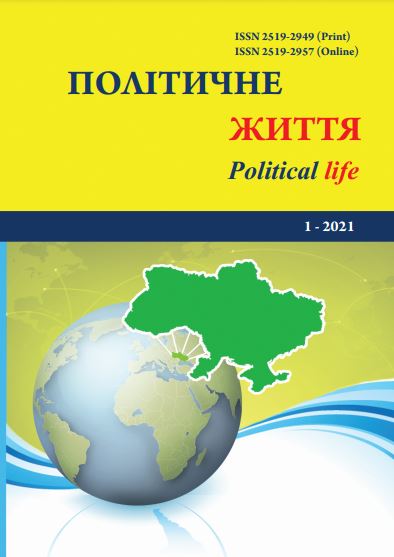The Role of the Transnistrian Conflict in Moldovan-Russian Relations
DOI:
https://doi.org/10.31558/2519-2949.2021.1.14Keywords:
the Transnistrian conflict; Moldova; Russia; bilateral relationsAbstract
Along with independence, the Republic of Moldova has acquired a problem that throughout the period under study had a negative impact on the development of domestic and foreign policy – the Transnistrian conflict which is classified as a “frozen conflict”. The aim of article is a research of the role and place of the Transnistrian conflict between Moldova and the Russian Federation which was originally involved in the process and its implications. Among the tasks of the work is to identify the main factors influencing this problem. Russia's position has effectively frozen the status quo over the Transnistrian conflict. With its support Russia assured Transnistria of the possibility of success in creating a state. Russian troops on the territory of Transnistria became weapons against Moldova. The more Moldova demanded that Russia withdraw them, the more the latter realized the importance of this argument. Despite numerous commitments, Russia is not withdrawing troops from Moldova because it wants to maintain its presence in the region by any means. The Transnistrian problem has a negative impact on Moldova's foreign policy for which the return of lost territory is one of the main goals. The existence of a conflict zone has a negative impact on Moldova's European aspirations, and the presence of Russian troops in Transnistria causes tensions in bilateral relations between Moldova and Russia, the EU and Russia, and has a negative impact on Moldova's neighbors in the New Eastern Europe. Progress in discussing the constitutional status of Transnistria is unlikely as is the withdrawal of Russian troops from Transnistria – the two main issues at the heart of the conflict. Russian troops are the only pillar of the Transnistrian regime and the main obstacle to achieving peace in the region. Even if Western economic pressure increases, the Transnistrian regime is unlikely to agree to democratization and demilitarization as it is a direct threat to its existence. Therefore, any Moldovan strategy has no chance of success because for Transnistria all “red lines” have already been passed.
References
Воронин В. Мы с Владимиром Путиным давно потеряли вкус к собственным хотелкам. URL: http://ru.interlic.md/2008-03-11/4303-4303.html (дата звернення: 20.11.2020).
Девятков А. В. «Меморандум Козака» в истории приднестровского урегулирования. Известия Алтайского государственного университета. 2010. № 4 – 2. URL: http://cyberleninka.ru/article/n/memorandumkozaka-v-istorii-pridnestrovskogo-uregulirovaniya#ixzz4KQoIVxBv (дата звернення: 20.11.2020).
Договор о дружбе и сотрудничестве между Российской Федерацией и Республикой Молдова 19 ноября 2001. URL: http://www.mid.ru/ru/maps/md/-/asset_publisher/dfOotO3QvCij/content/id/571548 (дата звернення: 20.11.2020).
Максименко И., Девятков A., Толкачова A. Приднестровское урегулирование – пилотный проект Россия-ЕС «перезагрузка»? Актуальні проблеми міжнародних відносин. Спеціальний випуск. 2011. № 102. ІІ. С. 80–93.
Приднестровский формат «5+2» устарел, поэтому его стоило бы заменить. URL: http://censor.net.ua/n330846 (дата звернення: 20.11.2020).
Степаненко С. В. Транскордонне співробітництво на нових східних кордонах Європейського Союзу. Актуальні проблеми державного управління. 2008. № 1 (33). С. 137 – 143.
International Crisis Group. Moldova’s Uncertain Future. The New Eastern Europe: Ukraine, Belarus, Moldova / ed. D. Hamilton, G. Mangott. Washington: Centre for Transatlantic Relations, 2007. Р. 77 – 126.
Mangott G. Deconstructing a Region. The New Eastern Europe: Ukraine, Belarus, Moldova / ed. D. Hamilton, G. Mangott. Washington: Centre for Transatlantic Relations, 2007. Р. 261 – 286.
Orenstein M. The Lands in Between. Russia vs the West and the New Politics of Hybrid War. Oxford: Oxford Univ. Press, 2019.
Rostoks T. Forms of Russian and EU Power in the ‘New Eastern Europe’. The Different Faces of “Soft Power”: The Baltic States and Eastern Neighborhood between Russia and the EU / ed. T. Rostoks, A. Spruds. Riga: Latvian Institute of International Affairs, 2015. Р. 8 – 29.
Sirbu O. Review – Cross Border Cooperation Development of European Union with Russia, Belarus, Ukraine and Moldova (2004-2010). Cross-border cooperation as a tool of spatial integration and cooperation between EU and eastern partner countries / ed. S. Devetak, O. Sirbu. Maribor: Iscomet, Institute for Ethnic and Regional Studies, 2012. URL: http://www.iscomet.org (дата звернення: 20.11.2020).
Smith K. E. Is the European Union’s soft power in decline? Current History. 2014. No. 113 (761). Р. 104 – 109.

